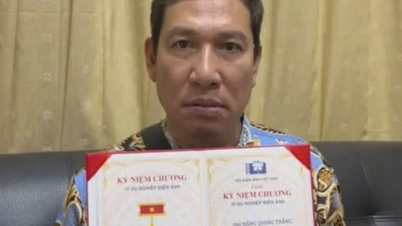NewZoo's 2020 Global Game Market Report once assessed that Vietnam has great potential and has made a breakthrough in the world's game industry. Many Vietnamese game industry CEOs also affirmed that if encouraged and supported by the necessary capital to start a business, many Vietnamese game businesses will confidently set up headquarters in Vietnam, create many quality games for the community, as well as contribute to the budget. However, moves such as the proposal to impose a special consumption tax on newly introduced games are considered to create great pressure on Vietnamese game businesses.
On April 1-2, 2023, in Ho Chi Minh City, an event that the Vietnamese gaming community has been eagerly awaiting took place, the Vietnam Game Festival 2023 (co-organized by the Department of Radio, Television and Electronic Information - Ministry of Information and Communications , VnExpress newspaper and Vietnam Game Alliance). The six main activities of the event attracted more than 20,000 participants.

There needs to be a multi-dimensional assessment and multi-faceted impact when deciding to impose special consumption tax on online games.
However, the most noteworthy thing is the impressions and emotions from this Festival. Like the emotion of Mr. Le Quang Tu Do - Director of the Department of Radio, Television and Electronic Information, because the dream of "the day when game makers sit together" has come true. The emotion is also because the Vietnamese game industry has potential and has left many global marks. However, success has come sporadically, because businesses want to go fast so they go alone. " Today, people look at the event and say this is the Vietnamese game industry, not organized by company A or company B. That is what the Ministry of Information and Communications has wanted for the past 15 years ", said Director Le Quang Tu Do.
The story of the potential and opportunities of the Vietnamese gaming industry has been emphasized many times before by the Director of the Department of Radio, Television and Electronic Information. According to Mr. Le Quang Tu Do, Vietnam currently has about 28.2 million gamers and is considered a dream number for many countries in the world. In 2021, the gaming industry's revenue in Vietnam reached 665 million USD. According to forecasts in 2022, the revenue of the Vietnamese gaming industry will be much more positive.
“Games are one of the rare fields in our country that can export digital content to the world. That is a strength that needs to be focused on developing and we expect it to be a key industry in digital transformation and developing Vietnam’s digital economy in the near future, ” said Mr. Le Quang Tu Do. Mr. Do also commented that in the near future, the game industry will definitely develop for two reasons: the number of gamers is very stable, and this is a field with a lot of innovation.
With such potential, it is unfortunate that, while in the world, Gaming has long been considered a smokeless industry that contributes significantly to the budgets of many countries (according to Newzoo statistics, the total revenue of the global gaming industry reached nearly 184 billion USD (down 4.3% compared to last year), of which 50% is mobile games), in Vietnam, in recent years, the gaming industry has been one of the industries that has suffered a lot of prejudice.
The media only mentions the negative side of the gaming industry, making the community perceive games as useless, even harmful, and that pursuing a “gaming career” will have no future. This prejudice leads to another consequence: the Vietnamese gaming industry is facing a serious shortage of high-quality human resources, especially in the field of game programming.
In addition, about half of the revenue from the game market in Vietnam belongs to foreign enterprises. Of the approximately 900 G1 game titles, nearly 90% come from abroad. According to the classification of electronic games by the Ministry of Information and Communications (MIC), G1 is a game with interaction between many players through the enterprise's server system. This is often a product with high intellectual content and brings in large revenue.
While the Vietnamese gaming community has not yet overcome the resentment caused by the prejudices that have not been removed, the recent fact that the Ministry of Finance, when drafting the Special Consumption Tax (SCT) Law, proposed to add the online electronic game service business to the SCT taxable objects with a reasonable tax rate, has ignited other resentments in the Vietnamese gaming community. According to the Ministry of Finance, one of the reasons given when proposing to impose SCT on games is that the current game business is a product with large revenue, high profit, attracting all ages and classes of people, especially young people, therefore, it is necessary to study and add it to the SCT taxable objects to guide consumption.
However, regarding the story of the large revenue of Vietnamese games, many opinions say that this is not entirely accurate because the total revenue of the Vietnamese game industry is only about 600 million USD, accounting for less than 0.5% of the global market. Chairman of the Vietnam E-Sports Association (VIRESA) Nguyen Xuan Cuong said: " Only 8% of people who use paid services when playing online games - are the target of the Special Consumption Tax. The goal of the tax is to reduce gaming behavior, but in reality, the impact only affects this 8%. Meanwhile, the industry's profit margin is only 3-8%. Therefore, it is unclear where the idea that games are highly profitable comes from." Vice Chairman of the Software Industry Association (VINASA) Le Xuan Hoa said that tax collection is currently only possible for legal games, while unlicensed and pirated games are not yet managed.
On the other hand, at the Vietnam Game Forum 2023, Mr. Nguyen Ngoc Bao - General Director of VTC Game also shared: Vietnamese game businesses are only at the potential level, in a nurturing state... while there are still too many risks and policy barriers that prevent the game industry from contributing, forcing them to go abroad. And Mr. Dau Anh Tuan - Deputy General Secretary of the Vietnam Federation of Commerce and Industry, after "clarifying" to Vietnamese games that many online games are currently being built in the direction of both playing and learning, helping players develop their imagination, thinking, and reflexes, affirmed: No country in the world imposes special consumption tax on games.
“ Therefore, it is necessary to have a multi-dimensional assessment and multi-faceted impact when deciding to impose special consumption tax on online games, ” said Mr. Dau Anh Tuan. According to many experts, imposing special consumption tax on games is something that needs to be carefully considered, otherwise it will easily lead to “reverse protectionism”, creating a “difficulty on top of difficulty” situation for Vietnamese games.

“ Instead of chasing after money-making opportunities, we want to demonstrate the creativity of Vietnamese people. Instead of chasing after profits, we want to pursue the development of the game industry in Vietnam. To have large revenues, a long-term vision is needed. We believe that we will be one of the pioneers in bringing large international revenues to the country with full tax obligations. With the current state of the industry, I also hope that the authorities will look deeply into the difficulties that game companies are facing, so that they can solve them ” - shared by Mr. Thai Thanh Liem - CEO of Topebox - one of the rare game studios with headquarters in Vietnam, self-producing more than 80 games, releasing worldwide, with many games leading markets such as China, the US, Japan... bringing in large revenues, contributing to the State budget - is absolutely a suggestion for policy makers to refer to. With a seedling, it is always much easier to stunt it than to nurture and grow it. That is no different from the Vietnamese gaming industry, which is also very cautious. And it should be even more noteworthy in the context where we are talking a lot about things like developing the cultural industry.
Nguyen Ha
Source



























![[Photo] President Luong Cuong works with Hung Yen and Thai Binh Provincial Party Committees on implementing Resolution of the 11th Central Conference, 13th tenure](https://vphoto.vietnam.vn/thumb/1200x675/vietnam/resource/IMAGE/2025/6/6/127b735d2761484d81dcee0d7725a25b)
![[Photo] General Secretary To Lam receives Korean Ambassador to Vietnam](https://vphoto.vietnam.vn/thumb/1200x675/vietnam/resource/IMAGE/2025/6/6/a0765b7543784cbcbfe4755b67d43ab4)




























































![[OCOP REVIEW] Tu Duyen Syrup - The essence of herbs from the mountains and forests of Nhu Thanh](https://vphoto.vietnam.vn/thumb/402x226/vietnam/resource/IMAGE/2025/6/5/58ca32fce4ec44039e444fbfae7e75ec)











Comment (0)